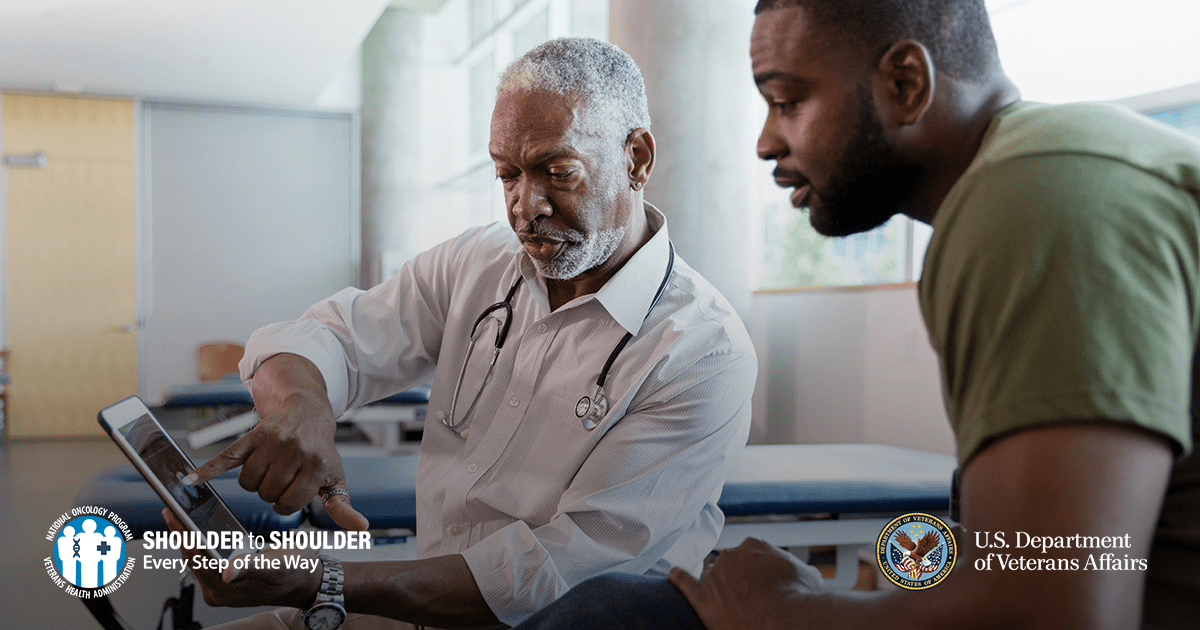What does equity in oncology mean? The positive impact of VA’s focus on health equity can be seen in the cancer care treatment outcomes of Black male Veterans. Prostate cancer is one of the most common diagnoses for the Veteran community.
When Black Veterans turn to VA for their prostate cancer care, they have better outcomes. Studies have shown that Black men who use VA for prostate cancer screening and care have significantly better outcomes than those using private health care services. This is because VA reduces barriers to access traditionally seen in non-VA settings, which minimizes racial disparities.
Equity effects outcomes
U.S. Army Veteran Percy Jackson of Pittsburgh, PA, started noticing something was wrong when he experienced urinary urgency. While he thought it might be because he was aging, he still decided to get it check out.
“They did a full work up and gave me the bad news that I did indeed have prostate cancer,” said Jackson.
Jackson found quality care at VA, with a quick diagnosis and an effective surgery that removed the cancer.
“I believe I’ve had excellent here at VA and I am able to do everything I want to do,” said Jackson. “I see a lot of satisfied Vets at VA.”
A Provider’s Perspective
Bruce Montgomery, MD, a medical oncologist focused on genitourinary cancers from VA Puget Sound, finds that leveraging precision medicine in oncology is one way VA is systematically implementing equitable cancer care.
“When a Veteran has advanced prostate cancer, VA providers try to find alterations in both the prostate cancer and in the Veteran’s own DNA which might influence their care,” Montgomery said. “These tests look for specific alterations with the tumor itself and in the normal DNA, searching for changes which they might have inherited. This means the care is shaped by a deeper understanding of what that individual Veteran may respond to best and may help their family to make decisions about their own health care.
Cancer care quality can vary by geographic location.
“Having both types of testing done isn’t always standard practice out in the community, but it’s part of the standard of care within VA,” Montgomery added.
If Veteran’s tumor or germline testing shows alterations, finding those changes can help Veterans to get better therapy and help their families make thoughtful and informed decisions about their health care in the future. Testing for precision therapies in this way in VA is an expectation of all providers for all Veterans and can give them access to therapy that can be very effective.
Dedicated resources for the Veteran community
The Center for Minority Veterans (CMV) works to ensure Veterans receive equal services regardless of race, origin, religion, or gender. The Office of Health Equity (OHE) works alongside VA’s programmatic efforts to provide individualized health care to each Veteran in a way that eliminates disparate health outcomes and assures health equity. The National Oncology Program stands shoulder to shoulder with the CMV and OHE to guarantee an equitable experience for Veterans.
If you are a minority Veteran, learn more about the Office of Health Equity here, and the Center for Minority Veterans here.
If you have question about cancer care at VA, email cancer@va.gov.
Topics in this story
More Stories
Dorothy “Pat” Rudd, 103, World War II Navy Veteran, has lived a life of service, pioneering the way for women in the military.
VA employees help return WWII items to two brothers’ families. Both brothers were WWII Veterans.
The Veterans self-check assessment takes about 10 minutes to complete and has resources that can help if stress and depression are affecting you.






I am retired military of proudly serving 21 years! I go to the VA clinic for checkups. One time my PSA went high & then referred me to local hospital & further tests confirmed I had prostate cancer. I had the surgery & been prostate cancer free since. This year will be 8 years in November. The minorities are the ones that are scared or laugh about getting checked